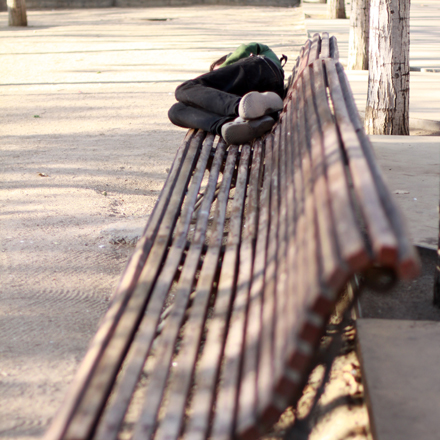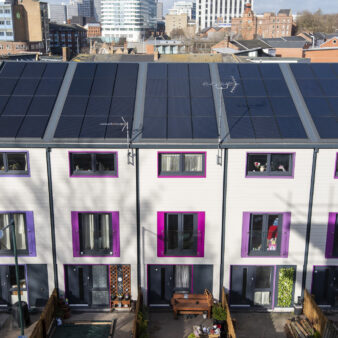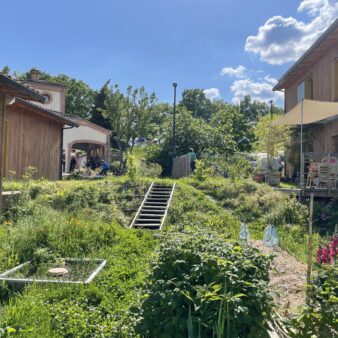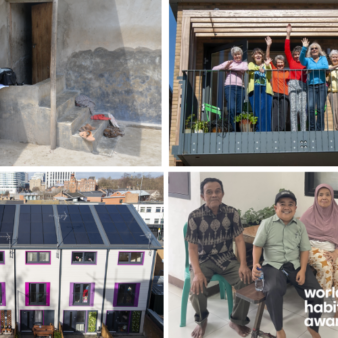
I was three and a half when dad died. Mum didn’t know how to cope and my relationship with her has been difficult ever since. She always had abusive partners and didn’t know how to look after me or herself very well. So, at sixteen I left home and began living in hostels. I just couldn’t be around her anymore. And my mental health problems – depression and agoraphobia – haven’t helped.
But I can’t worry about her or myself now because I’ve got to look out for my daughter. She’s thirteen and the reason I finally left. I could stand the control, being told where I could go and who I could see, even as it chipped away at me day after day, emotionally and physically. I could stand the black eyes and the nasty comments. But he crossed a boundary when he started to involve my child. I probably wouldn’t have left otherwise… I had already taken him back twice. But this time he had gone too far.
She used to love performing. She was so bubbly and outgoing and would come to light on stage. It made her so happy. But one day it all stopped. She became withdrawn and didn’t want to go out of the house. She stopped seeing her friends and only wanted to spend time with me. I knew I had to do something and I was terrified about it.
When I finally managed to find help, I cried like I never had before. It was as if all the emotions buried by years and years of pretending that I was okay, that I was happy, that I wasn’t scared – were suddenly released and I couldn’t speak, I couldn’t even breathe.
I approached five or six refuges before I was accepted anywhere. Many seemed open and able to help me, but as soon as I mentioned my mental health problems they were suddenly “full up.” I’d nowhere to go because I’d had to leave all my family and friends in my hometown. There’s no way I could go back because it’s a small place – as soon as someone saw me on the street it would get back to him and he’d find me
Eventually, I found a place here. The staff have made me feel so welcome and I finally have somewhere secure to stay without worrying about him finding me. I can come to activities and groups where I’ve met other women who’ve had similar experiences to me and I also have my support worker to talk to and help me.
* * *
I was told this story* at a women’s coffee morning at a charity offering services for people escaping domestic abuse. I was visiting the organisation as part of my internship programme at World Habitat, where I work on the European End Street Homelessness Campaign. Our Campaign is people-centred, meaning we go out onto the streets to get to know every homeless person by name and understand their needs. This has shown us that women who sleep rough are even more vulnerable than men. In Brighton, for instance, nearly twice as many women than men reported being attacked whilst sleeping on the streets. Whilst our work is centred on supporting rough sleepers, homelessness takes many different forms – sofa surfing, living in squats and sleeping in insecure accommodation. Whatever form it takes, women’s homelessness remains under-reported and most often linked to experiences of abuse. One in four women experiences domestic abuse in their lifetime and it’s organisations like this one that I visited, offering accommodation, full emotional support, and practical advice around education, housing and work, that are crucial in helping them move forwards from such traumatic, and all too frequent, experiences.
I was stunned by the ease with which the woman in front of me opened up and recounted her life story. Were her experiences so normalised in her everyday reality, that it was easy to talk about them because they didn’t seem traumatic anymore? Or maybe it was a relief to finally be able to be open and truthful to herself and to others that it was cathartic to speak, even to me as a stranger.
I was reminded of a phrase from 20th century African-American writer, Zora Neale Hurston’s, autobiography, “there is no agony like bearing an untold story inside you”. There’s something healing and empowering in making your voice heard. The articulation of words lends an individual’s story authenticity and in doing so recognises and values them and their experiences. This is particularly pertinent to those who’ve lived through domestic abuse, who are made to feel insignificant and worthless by their partners. Many are isolated from friends, family, and much of the outside world, leaving no support network. This makes refuges and services vital, so women can take the first steps towards building a new life and rediscovering their voices.
For someone experiencing domestic abuse, reaching out is extremely difficult, making it even more imperative that when they do, the right type of accommodation and services are available. But, as this individual’s story shows, people aren’t receiving the support that they need. Refuge, the UK’s largest single provider of specialist domestic and gender-based violence services, has experienced cuts to four-fifths of its services since 2011, with some funding being cut by up to half [1]. And since 2010 local authority funding for refuges across England, Wales and Scotland has been cut by an average of £38,000 each [2]. Day-to-day, these closures mean that women fleeing abusive relationships are turned away. Between May and October 2017, more than 1,000 women and children were refused entry at shelters, as pledges to increase funding for women escaping violent partners did not come to fruition [3].
In the worst-case scenarios, when they don’t receive the help they need, women often have no option but to remain where they are, to return to the perpetrator or become homeless. According to Women’s Aid, access to shelter is the most frequent co-presenting issue with domestic abuse and ‘most women find it a battle to get rehoused [and…] can be in temporary accommodation between six months [and] five years.’ [4] This raises two important questions. First, why are we seeing cuts to services when what is clearly needed is greater support and guaranteed accommodation to prevent homelessness for those who have suffered domestic abuse? And second, surely a gendered approach to tackling homelessness is essential, given the distinct ways in which women experience it?
When in an abusive relationship, a woman is most likely to be killed when she leaves her partner and so stepping away is both a dangerous and courageous hurdle. Once overcome, a lack of safe refuges and secure, affordable housing become barriers to her independence and recovery. This July, MHCLG announced almost £19 million in funding to expand support for survivors of domestic abuse. We are now eagerly awaiting the government’s new Domestic Abuse Bill, which aims to transform the response to domestic abuse and, most importantly, focuses on prevention. Could this pave the way towards effective and sustainable domestic abuse services? It’s certainly a start. What is clear is that only when change happens, will women gain the ability to transcend the barriers which have kept them trapped in cycles of abuse, and to reclaim their bodies and their voices.
*exact words have been changed and some details altered or omitted to protect the person’s identity.
[1] Refuge (2018) Domestic Violence: The Facts https://www.refuge.org.uk/our-work/forms-of-violence-and-abuse/domestic-violence/domestic-violence-the-facts/
[2] Grierson, J. (2018) https://www.theguardian.com/society/2018/mar/23/council-funding-womens-refuges-cut-since-2010-england-wales-scotland
[3] Buchan, L. (2017) https://www.independent.co.uk/news/uk/politics/women-refuge-budget-cut-quarter-domestic-violence-victims-children-support-a8003066.html
[4] Women’s Aid (2018) Survival and Beyond: The Domestic Abuse Report 2017. Bristol: Women’s Aid.
Image credit: Juan Lemus




Join the discussion